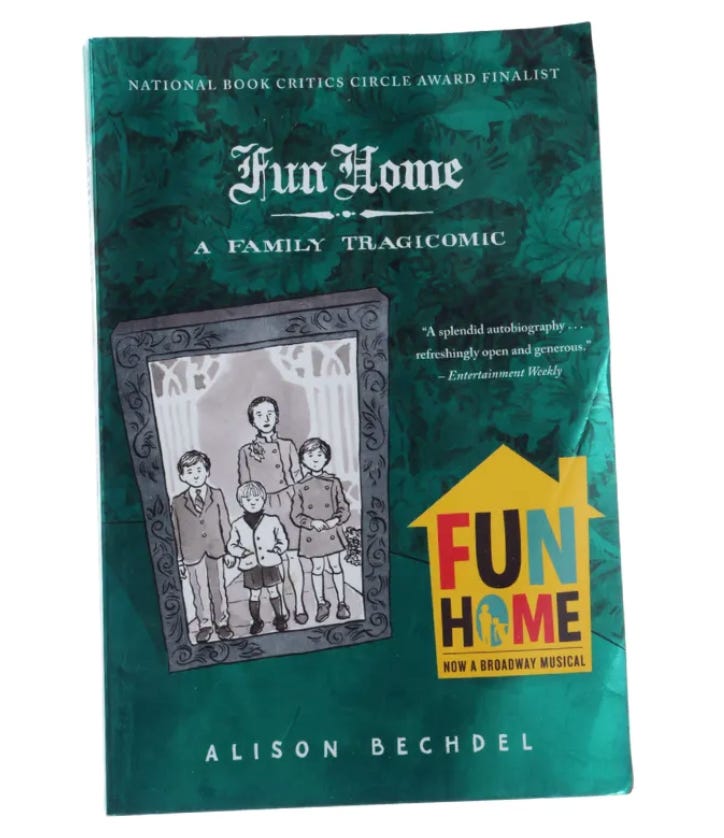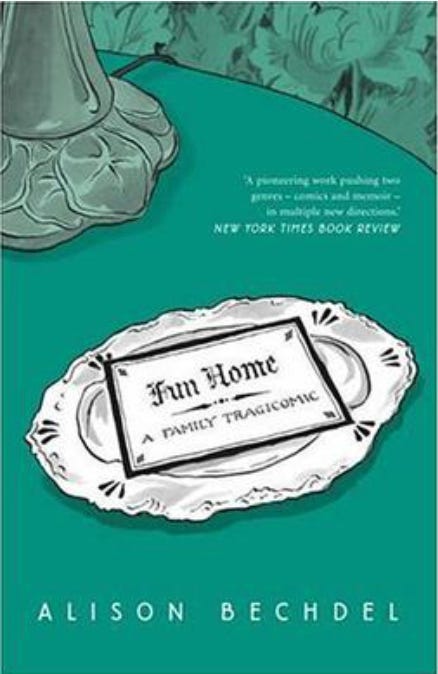FUN HOME - Serio Comics 35
FUN HOME written and drawn by Alison Bechdel, published by Houghton Mifflin then Mariner Books
The New York Times’ #35 Best Book of the 21st Century

This week The New York Times finished publishing its list of the 100 Best Books of the 21st Century.
There were two works of graphic literature on the list.
One was PERSEPOLIS by Marjane Satrapi, who is an author featured in Serio Comics 6 with her follow-up EMBROIDERIES, at #48.
And the other was FUN HOME by Alison Bechdel, who was mentioned as a foremother to Laurie Sandell and her THE IMPOSTER’S DAUGHTER.
FUN HOME came in at #35.
And this is Serio Comics post 35.
So it felt apropos ;)
Here’s what Alexandra Jacobs wrote for the newspaper:
Alison Bechdel
Originally known for the long-running comic strip DYKES TO WATCH OUT FOR, Alison Bechdel came to critical and commercial success in 2006 with her graphic memoir FUN HOME, which was subsequently adapted as a musical that won a Tony Award for Best Musical in 2015.
In 2012, she released her second graphic memoir ARE YOU MY MOTHER?
She was then a 2014 recipient of the MacArthur "Genius" Award.
Recently in 2021, she published her third graphic memoir SECRETS TO SUPERHUMAN STRENGTH, which explored fitness: physical, mental, and spiritual.
She is also widely known for originating The Bechdel Test.
This measure of the representation of women in film and other fiction asks whether a work features at least two female characters who have a conversation about something other than a man. And that those two female characters have names.
A Family Tragicomic
Is the subtitle of Bechdel’s book.
In which she charts her complicated relationship with her late father.
Distant and exacting.
Bruce Bechdel was an English teacher.
And director of the town funeral home, which Alison and her family referred to as the Fun Home.
It was not until college that Alison, who had recently come out as a lesbian.
Discovered that her father also had homosexual relationships.
A few weeks after this revelation, and a divorce request from her mother, he was dead.
Leaving a legacy of mystery for his daughter to resolve.
A Literary Why-Done-It Story
While the book is a tragicomic it is also a literary detective story.
Bechdel is constantly framing the question of what happened to her father and what happened between them with the literature that they had shared or she had read.
It’s this autobiographical literary searching in comics form that likely impressed upon so many readers and critics that graphic literature is true literature.
And it’s something I related to after the death of my father when I wrote the experimental THIS BOOK IS THE LONGEST SENTENCE EVER WRITTEN AND THEN PUBLISHED.
Voicey Voice-Over Narration
Another one of the major reasons FUN HOME is considered such a serious work of literature is its first person narration device.
Bechdel’s narration is as verbose and constant but also as deep and complex as any literary memoir.
And yet it’s her juxtaposition of word and image that shows why graphic literature has become so relevant in the 21st Century.
even devoted a recent Substack post to why graphic literature might be the actual defining literature of the 21st Century that critics haven’t caught up to yet.For instance, in this panel, the text discusses Oscar Wilde’s queer court history while the image shows Alison’s mother practicing a Wilde play, simultaneously paralleling Alison’s father’s trial related to his queerness.
Serio Comic Sexuality
Bechdel is also renown for her depiction of sexuality in visual form.
She vividly portrays her and her college girlfriend joyously realizing the undertones of a Roald Dahl story.
Here is her comparison of her sexual odyssey to the Sirens and other elements of Homer’s.
This frankness is not without controversy, as it has been challenged and removed from libraries due to its contents.
Art vs Parenting
Perhaps my favorite theme though during this re-reading of Bechdel’s book is the question of how to live your life.
Bechdel shows the strain on her creative parents after having kids.
How they left their lives in New York City and then Europe for the rural life near Bruce’s family of origin.
Bechdel reflects on disliking their constant needs for creative solitude.
Yet she learns to fulfill the same needs through her own creativity.
Which later helped her make her masterpiece…

The 7-year-long project was nominated for several awards, including the National Book Critics Circle Award and three Eisner Awards, and it won the Eisner Award for Best Reality-Based Work.
Literary Influence on SHOULD WE BUY A GUN?
Bechdel’s unflinching and prolific use of other writers’ quotes is something that greatly influenced the upcoming SHOULD WE BUY A GUN?
Including having characters quote directly from others.
And it’s something that I believe I’ve updated even further with having things like music lyrics and Instagram memes.

































